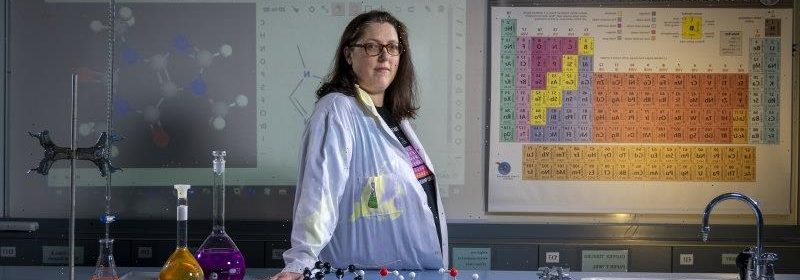Goodbye periodic table?: VCE chemistry set for elemental change

Lessons on the periodic table and the chemical structure of food could be erased from VCE chemistry classes to make room for the teaching of “green chemistry principles” such as recycling metals and plastics.
VCE chemistry will be changed in 2023 as education authorities seek to strip back a subject they say has become cluttered with content but lacks emphasis on how chemistry can contribute to environmental sustainability.
Chemistry teacher Melissa MacEoin.Credit:Wayne Taylor
But the proposal has been greeted with concern by many Victorian teachers who fear “the mystery and wonder of chemistry” risks being crowded out by a narrower focus on industrial processes.
During consultation, teachers have also expressed fears that dumping the teaching of the elements in the periodic table at VCE level could leave Victorian students out of step with other states and with countries such as Singapore, China and the UK.
.Credit:Illustration: Matt Golding
Experienced chemistry teacher Melissa MacEoin said the periodic table underpinned the entire study of chemistry and that cutting it from the subject’s study design would be “a bit like learning a language without first of all learning its alphabet so you can put it together”.
“All things are made of atoms, and chemistry is the study of atoms and how they go together. Those atoms are the 118 elements on the periodic table,” Ms MacEoin, who is also the current president of teachers’ group the Chemistry Education Association, said of its proposed removal.
The study of the periodic table in unit one of VCE chemistry would be replaced by “the study of metals, carbon compounds and polymers and how they can be recycled and repurposed in a circular economy”, the Victorian Curriculum and Assessment Authority’s subject review states.
“That’s a very industrial perspective on chemistry,” Ms MacEoin said. “Whereas the old design has a bit of the history and the story and the amazement that an atom in your little finger was once the very same atom that was in the tail of a dinosaur.”
While the periodic table will continue to be taught in year 9 and 10 science classes, Ms MacEoin said classes at those year levels lacked the depth of VCE chemistry.
Chemistry is a prerequisite for studying medicine at university and is consistently among the 10 most popular VCE subjects; 10,518 students sat the exam last year.
Jan van Driel, professor of science education at the University of Melbourne’s Graduate School of Education, said the changes were appropriate and would make VCE chemistry more contemporary and hopefully more relevant to today’s students.
“The trouble with curriculum revisions in science is always that the need to include modern or contemporary knowledge requires the removal or reduction of ‘old’ topics,” Professor van Driel said.
“Globally, science curricula are overloaded because lots of new knowledge is added and not all that much has been removed.”
Excessive content forced teachers into superficial treatment of the subject and was contributing to a declining interest in science, he said.
The Victorian Curriculum and Assessment Authority is consulting with the public about its draft study design for VCE chemistry until August 3 and will revise the subject further based on feedback.
Study designs are routinely reviewed every five years.
The authority said practical elements of the current subject related to food chemistry had been retained in the proposed new design, with more specific biomechanical detail deleted.
Students would also have the chance to study food more extensively as part of an investigation within the new version of the subject.
The Morning Edition newsletter is our guide to the day’s most important and interesting stories, analysis and insights. Sign up here.
Most Viewed in National
From our partners
Source: Read Full Article


